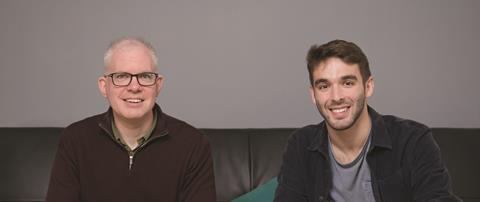Garfield Law, a pioneering firm providing legal services through AI, has been approved by the SRA. The founders, a City lawyer and a quantum physicist, are targeting LiPs and high street firms
In his latest speech enthusing about digital justice, the master of the rolls said last month that what might have sounded outlandish even a year ago is now accepted wisdom. ‘People are considering the hows and the whens; no longer the whethers,’ he told the International Forum on Online Dispute Resolution.
Within days, the Solicitors Regulation Authority made its own contribution to the burgeoning digital civil justice infrastructure. In an announcement with echoes of those hailing the first alternative business structures a dozen years ago, it revealed that it had authorised its first law firm providing legal services through artificial intelligence.
Chief executive Paul Philip described the authorisation of Garfield Law as ‘a landmark moment for legal services in this country’, predicting it would be ‘first of many AI-driven law firms’.
Garfield Law, a five-employee startup founded by a City lawyer and a quantum physicist, specialises in small-claims debt recovery. Headline writers, including those of the Financial Times where the SRA apparently dropped the story over the bank holiday weekend – when business news is generally scarce – made much of just one of Garfield’s offerings: a £2 ‘polite chaser’ letter.

But founder Philip Young told the Gazette the system, based on an ‘enterprise grade’ large language model, ‘can handle the entirety of a small-claim track debt claim’. Even if a claim is one of the tiny minority to go to county court, the system is there ‘to hold your hand’, he said. ‘It can do everything apart from conducting the oral arguments.’
Garfield was at least partially born of the pandemic. Young, admitted in 1999, decided in 2022 to retire from boutique litigation firm Cooke, Young & Keidan, which he had co-founded after an early career at Hill Dickinson and Baker Mackenzie. It was also when ChatGPT showed the world the potential of large-language model AI.
‘I’ve always been a big nerd, and I had time to have a good play with the software. I thought “Crikey, this is going to revolutionise legal practice, probably in a good way”. Then in 2023, GPT4 brought a big jump in capability. ‘I thought: why not build something?’
The idea for small claims came from a self-employed relative’s frustration with chasing small creditors. The technology expertise came from co-founder Daniel Long, then working on a PhD in quantum physics. The company name? ‘It basically started as a joke – but then nobody could think of a better one.’
'The system will free up lawyers to focus on the higher level and more valuable work. I think most lawyers will appreciate this'
Philip Young, Garfield Law
Garfield was presented to the senior judiciary and others at the Civil Justice National Forum last November – and to the SRA. Approval took eight months. The SRA ‘has been very scrupulous, they put me through a grilling’, he said. The regulator says it made several conditions: the system must not propose case law, an area notoriously prone to AI ‘hallucinations’ and must not be autonomous - it requires the client’s approval for every step of the way.
‘Garfield operates like a good law firm,’ Young said. ‘We get the facts from the client and processes from the firm. It puts together a letter and sends it back to the client to check. It keeps the client in control of the process.’
For the moment, Young said, he is personally checking all outputs, though clearly if the system takes off this will not be viable.
Apart from litigants in person who would otherwise plague the court with carrier bags full of papers, the system is aimed at lawyers, Young said - particularly at high street firms. ‘It’ll remove a lot of the lower-value, often repetitive, administrative work in each case that has to be done but is time-intensive and hence costly for clients. It’ll therefore free up lawyers to focus on the higher level and more valuable work. I think most lawyers will appreciate this.’
In his speech last month, Sir Geoffrey Vos spoke of the wider consequences of relying on antiquated dispute resolution systems. ‘There is a critical imperative for us to develop digital methods to resolve disputes quickly and cheaply. It is obvious that the 1,800 full-time judges that we have in this country could never resolve those disputes themselves. And luckily they do not need to.’
The master of the rolls was speaking specifically of online models such as those set up by Amazon and eBay (see column, p12). But he said that AI had a role, too. As for the SRA: ‘We will be monitoring progress of this new model closely, so we can both manage the risks and realise the benefits to consumers,’ Philip said.




































13 Readers' comments